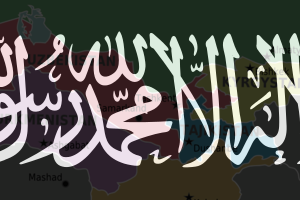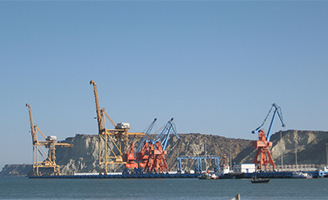Islamic State in Central Asia: threat or opportunity
By Charlie Smith (08/07/2015 issue of the CACI Analyst)
Central Asia is a key region that many believe has fallen into the crosshairs of the terrorist group calling itself the Islamic State (ISIS). Local governments are gravely concerned about returning fighters and possible ISIS infiltration in the region, and foreign powers, especially neighboring Russia and China, have expressed their deep concerns. This grim picture, however, obscures a more complex, and perhaps more accurate, story. Might the specter of ISIS have less to do with its on-the-ground ability to destabilize the region and more to do with the geopolitical concerns of those who are stating these threats?

CACI Analyst, April 15, 2015
Contents
Analytical Articles
CHINA AND PAKISTAN PREPARE TO ESTABLISH ECONOMIC CORRIDOR, by Ghulam Ali
DAGESTAN'S INSURGENTS SPLIT OVER LOYALTIES TO CAUCASUS EMIRATE AND IS, by Emil Souleimanov
GEORGIA'S ECONOMIC CRISIS AND POLITICAL BRINKMANSHIP, by Ariela Shapiro
THE CHINA-ARMENIA DECLARATION AND BEIJING'S PROSPECTS IN THE SOUTH CAUCASUS, by Eduard Abrahamyan
Field Reports
GEORGIA'S FORMER DEFENSE MINISTER BLAMES GOVERNMENT FOR DAMAGING STATE INTERESTS, by Eka Janashia
ARMENIA-EU RELATIONS ENTER A NEW PHASE, by Erik Davtyan
AZERBAIJAN AND THE IRAN AGREEMENT, by Mira Muradova
KYRGYZSTAN MARKS FIFTH ANNIVERSARY OF REVOLUTION, by Arslan Sabyrbekov
China and Pakistan Prepare to Establish Economic Corridor
By Ghulam Ali (04/15/2015 issue of the CACI Analyst)
Beijing and Islamabad have completed the groundwork for the implementation of the China-Pakistan Economic Corridor (CPEC). A final decision with a clear roadmap is expected during Chinese President Xi Jingping’s much-awaited visit to Pakistan in May 2015. The CPEC is the largest project not only in the relationship between the two states, but also in Pakistan’s history. The future of Sino-Pakistan relations will hinge upon corridor’s success.

The China-Armenia Declaration and Beijing’s Prospects in the South Caucasus
By Eduard Abrahamyan (04/15/2015 issue of the CACI Analyst)
The visit of Armenia’s President Serzh Sargsyan to the People’s Republic of China on March 24, following his moderate criticism of Russia’s arms deliveries to Azerbaijan, emanated in the signature of a bilateral comprehensive declaration signed between Armenia and China. One of the document’s significant pillars is Armenia’s enrollment in China’s “Silk Road Economic Belt.” Another is an accord to cooperate in the defense and military sphere, emphasizing mutual “military support.” The declaration combined over ten special agreements, involving various ministries of both states, and a preferential loan for adapting and modernizing custom services. China’s agreements with Armenia, coupled with its interest vis-à-vis Azerbaijan and Georgia, heralds China’s economic and political penetration in the South Caucasus.
CACI Analyst, March 18, 2015
CACI Analyst, March 18, 2015 (.pdf)
Contents
Analytical Articles
TURKMENISTAN POISED FOR TAPI BREAKTHROUGH, by Micha'el Tanchum
NEMTSOV'S ASSASINATION AND THE CHECHEN TRACE, by Emil Souleimanov
RUSSIA TO STRIP ABKHAZIA AND SOUTH OSSETIA OF THEIR LIMITED SOVEREIGNTY, by Valeriy Dzutsev
ARMENIA'S RULING PARTY CONSOLIDATES POWER, by Armen Grigoryan
Field Reports
KYRGYZ CRIME BOSS MURDERED IN MINSK, by Arslan Sabyrbekov
GEORGIA FACES ECONOMIC CRISIS, by Eka Janashia
TAJIKISTAN'S ELECTIONS EXPEL OPPOSITION FROM PARLIAMENT, by Oleg Salimov
ARMENIA TO PARTICIPATE IN BAKU 2015 EUROPEAN GAMES, by Mina Muradova





